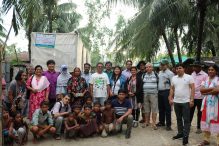The first day of the 2017 SRSC South Asia was loaded with activities as the participants which includes farmer leaders and representatives from farmer organizations (FOs) under the MTCP2 South Asia, representatives from the Bangladesh Ministry of Agriculture, as well as development partners visited a community seed bank and met with dry fish producers and members of Bangladesh Fish Workers Alliance. This year’s SRSC SA was held in Cox’s Bazar, Bangladesh on 22-25 August 2017.

Community Seed Bank
The participants of the SRSC South Asia visited the Khurushkul Seeds Bank in Cox’s Bazar. The seed bank was established by the Khurushkul Farmers Association with the support from the COAST Trust and MTCP2 Program.
In her message during the visit, Asian Farmers’ Association for Sustainable Rural Development (AFA) Secretary General Esther Penunia commended the efforts of the farmers in preserving and reproducing local seeds and assured them that they are not alone in their endeavor and that they share the goals of many farmers in Asia. According to Penunia, all the countries in South Asia, Southeast Asia and the Pacific implementing the MTCP2 program have initiatives on community seed banks.
“There might come a time when farmers will no longer need the seeds of multi-national corporations. Farmers will be able to have quality seeds right at their doorsteps, in their community, free or with very minimum price”, says Penunia during the short meeting with the farmers.
Because private companies control the seeds in the market, MTCP2 Bangladesh is regaining the control of seeds for the farmers by forming groups of farmers and providing them training on quality seed production and preservation, supporting them to establish a community seed bank, supporting them in their campaign and helping them in marketing their products locally. The seed bank helps the group members and the community be self-reliant in seeds and it is also a source of additional income for the farmers. Through MTCP2, 14 seed-producing groups have been formed so far.

Dry Fish Production
Cox’s Bazar, being a coastal town, is the biggest source of dry fish in Bangladesh. Majority of the population in this area rely on the production of dried fish for their livelihood. However, there in a rampant use of hazardous pesticides in preserving seawater fishes. Thus, consumers are getting chemical-coated dried fish, which poses health risks.
COAST Trust and Bangladesh Fish Workers Alliance, with the support of MTCP2, have been working to motivate dry fish producers to stop the use of chemicals in dry fish production. COAST Turst provides simple technology of organic dry fish production to small fisher folks and at the same time, they create demand for pesticide-free dry fish in the market.

MTCP2 Bangladesh conducted trainings on different eco-friendly methods of dry fish production such as using nets, using turmeric water, fish dryer, etc. to groups of dry fish producers. So far, there have been 6 groups developed who are producing dry fish without the use of pesticides.
According to Fatima Begum, dry fish producer, pesticide-free dry fish sells higher in the market. She also added that when they were producing fish with the use of pesticides, it attracts a lot of insects, but when they started using alternative techniques, insects no longer flock to the fish drying area.

To wrap up the field visit, the delegates briefly met with the members of Bangladesh Fish Workers Alliance.
The field visit is just one of the activities for the SRSC South Asia. During the two-day meeting, the participants also shared their success stories and good practices and voted for their favorite story from all the submissions from Bangladesh, Sri Lanka, India and Nepal during the KM Fair.
MTCP2 Monitoring and Evaluation Officer Bernie Galang conducted a training on the new MIS system. Meanwhile, MTPC2 Program Manager Lany Rebagay facilitated the reporting of updates from the MTCP2 national implementing agencies in South Asia.
The SRSC South Asia is organized by the COAST Trust, the national implementing agency of MTCP2 in Bangladesh. MTCP2 is implemented by the consortium Asian Farmers’ Association for Sustainable Rural Development (AFA) and La Via Campesina (LVC) and is supported by the International Fund for Agricultural Development (IFAD), the Swiss Agency for Development and Cooperation (SDC), and the European Union (EU). ###

About MTCP2
The Medium Term Cooperation Program Phase 2 (MTCP2), a five-year capacity building program supported by the International Fund for Agricultural Development (IFAD), the Swiss Agency for Development and Cooperation (SDC), and the European Union (EU), has been implemented in 19 countries across three sub-regions—Southeast Asia, South Asia, and the Pacific—engaging 1,544 sub-national farmers organizations (FOs) with a total membership of around 22 million farmers.
The funding support (total budget of $ 5 million for the whole duration of the project across 19 countries) serves as a catalytic fund that will allow FOs to enhance their capacity to be effective channels of economic services to farmers.
So far, the program has contributed to the formation of strong national platform of FOs with improved capacity to engage in policy processes and mobilize resources from mainstream agricultural development programs like extension services, credit, and pre and post harvest facilities. The program also helped in transforming farmers associations into commodity-based cooperatives to strengthen the role of small-scale farmers within an inclusive and sustainable value-chain.
The program is being implemented by the consortium Asian Farmers’ Association for Sustainable Rural Development (AFA) and La Via Campesina (LVC).

Comments are closed